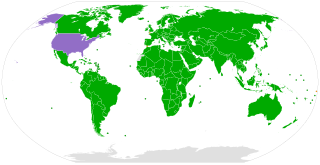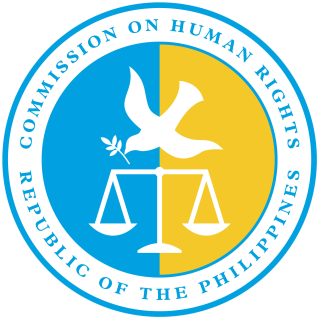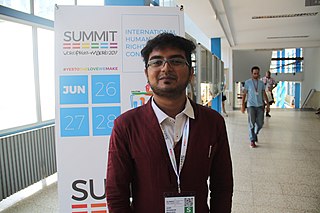Related Research Articles

The United Nations Convention on the Rights of the Child is an international human rights treaty which sets out the civil, political, economic, social, health and cultural rights of children. The convention defines a child as any human being under the age of eighteen, unless the age of majority is attained earlier under national legislation.
Child sex tourism (CST) is tourism for the purpose of engaging in the prostitution of children, which is commercially facilitated child sexual abuse. The definition of child in the United Nations Convention on the Rights of the Child is "every human being below the age of 18 years". Child sex tourism results in both mental and physical consequences for the exploited children, which may include sexually transmitted infections, "drug addiction, pregnancy, malnutrition, social ostracism, and death", according to the State Department of the United States. Child sex tourism, part of the multibillion-dollar global sex tourism industry, is a form of child prostitution within the wider issue of commercial sexual exploitation of children. Child sex tourism victimizes approximately 2 million children around the world. The children who perform as prostitutes in the child sex tourism trade often have been lured or abducted into sexual slavery.

The National Human Rights Commission of India is a statutory public body constituted on 12 October 1993 under the Protection of Human Rights Ordinance of 28 September 1993. It was given a statutory basis by the Protection of Human Rights Act, 1993 (PHRA). The NHRC is responsible for the protection and promotion of human rights, defined by the act as "Rights Relating To Life, liberty, equality and dignity of the individual guaranteed by the constitution or embodied in the international covenants and enforceable by courts in India".
Child grooming is befriending and establishing an emotional connection with a minor under the age of consent, and sometimes the child's family, to lower the child's inhibitions with the objective of sexual abuse. Child grooming is also used to lure minors into various illicit businesses such as child trafficking, child prostitution, cybersex trafficking, or the production of child pornography.

Child protection is the safeguarding of children from violence, exploitation, abuse, and neglect. Article 19 of the UN Convention on the Rights of the Child provides for the protection of children in and out of the home. One of the ways to ensure this is by giving them quality education, the fourth of the United Nations Sustainable Development Goals, in addition to other child protection systems. To protect a child has to start from conception, even how the conception took place can affect the child's development. For proper child development to take place child protection must be put into consideration.

Bulgaria joined the European Union in 2007, its compliance with human rights norms, however, is far from perfect. Although the media have a record of unbiased reporting, Bulgaria’s lack of specific legislation protecting the media from state interference is a theoretical weakness. Conditions in Bulgaria’s twelve aging and overcrowded prisons generally are poor. A probate reform in mid-2005 was expected to relieve prison overcrowding.

Human rights in the Middle East have been shaped by the legal and political development of international human rights law after the Second World War, and their application to the Middle East. The 2004 United Nations Arab Human Development Report (AHDR) claimed that although Arab-Islamic tradition does hold unique importance for ideas of human welfare, History has proven that "they were not sufficiently prevalent in society to foster a culture based on a political contract, and allow for the legitimacy of differences of opinion, dialogue and transfer of power." Issues of the validity of democracy in the region and human rights are at the very centre of the challenges facing Middle Eastern society today.

Shantha Sinha is an Indian anti-child labour activist. She is the founder of Mamidipudi Venkatarangaiya Foundation, popularly known as MV Foundation, and is a professor in the Department of Political science in Hyderabad Central University. She headed the National Commission for Protection of Child Rights for two consecutive terms ; The National Commission for Protection of Child Rights (NCPCR) was set up in March 2007 under the Commission for Protection of Child Rights Act, 2005, an Act of Parliament. Sinha was its first chairperson. She was awarded the civilian honour of Padma Shri by the Government of India in 1998.

The Commission on Human Rights (CHR) is an independent constitutional office created under the 1987 Constitution of the Philippines, with the primary function of investigating all forms of human rights violations involving civil and political rights in the Philippines.
The Scottish Human Rights Commission (SHRC) is the national human rights institution for Scotland. It was established by the Scottish Commission for Human Rights Act and started its work in 2008. The Commission is independent of the Scottish and UK Government, and of Parliament.
Child pornography is illegal in most countries, but there is substantial variation in definitions, categories, penalties, and interpretations of laws. Differences include the definition of "child" under the laws, which can vary with the age of sexual consent; the definition of "child pornography" itself, for example on the basis of medium or degree of reality; and which actions are criminal. Laws surrounding fictional child pornography are a major source of variation between jurisdictions; some maintain distinctions in legality between real and fictive pornography depicting minors, while others regulate fictive material under general laws against child pornography.
A children's ombudsman, children's commissioner, youth commissioner, child advocate, children's commission, youth ombudsman or equivalent body is a public authority in various countries charged with the protection and promotion of the rights of children and young people, either in society at large, or in specific categories such as children in contact with the care system. The agencies usually have a substantial degree of independence from the executive, the term is often used differently from the original meaning of ombudsman, it is often an umbrella term, often used as a translation covention or national human rights institutions, dealing with individual complaints, intervening with other public authorities, conducting research, and – where their mandate permits them to engage in advocacy – generally promoting children's rights in public policy, law and practice. The first children's commissioner was established in Norway in 1981. The creation of such institutions has been promoted by the United Nations Committee on the Rights of the Child, and, from 1990 onwards, by the Council of Europe.
Amod K. Kanth is a social activist, and former policeman who is best known as the founder of the NGO Prayas, being a children rights advocate and chairperson of the Delhi Commission for Protection of Child Rights (DCPCR). He is also linked with the Uphaar Cinema fire and the 1984 Sikh Riots.
The National Commission for Protection of Child Rights (NCPCR) is an Indian statutory body established by an Act of Parliament, the Commission for Protection of Child Rights (CPCR) Act, 2005. The Commission works under the aegis of Ministry of Women and Child Development, GoI. The Commission became operational on 5 March 2007.
Child sexual abuse laws in India have been enacted as part of the child protection policies of India. The Parliament of India passed the 'Protection of Children Against Sexual Offences Bill (POCSO), 2011' regarding child sexual abuse on 22 May 2012, making it an Act. A guideline was passed by the Ministry of Women and Child Development, India. The rules formulated by the government in accordance with the law had also been notified on the November 2012 and the law had become ready for implementation. There have been many calls for more stringent laws.
The Delhi Commission for Women (DCW) is a statutory body of the Government of Delhi constituted to investigate and examine all matters relating to the safety and security of women under the constitution and other laws in Delhi, India.
Mamatha Raghuveer Achanta is a women's and children's rights activist. She has served as chairperson of the Child Welfare Committee, Warangal District, as a member of the A.P. State Commission for the Protection of Child Rights, and as the founder and executive director of Tharuni, a non-government organization (NGO) that focuses on the empowerment of girls and women. She has participated in rescues and adjudicated issues such as exploitation, violence, child sexual abuse, child marriages, and child neglect.

Gopi Shankar Madurai, born 13 April 1991, is an Indian equal rights and Indigenous rights activist. Shankar was one of the youngest, and the first openly intersex and genderqueer statutory authority and one of the candidates to contest in 2016 Tamil Nadu Legislative Assembly election. Shankar is also the founder of Srishti Madurai Student Volunteer Collective. Shankar's work inspired the Madras High Court to direct the Government of Tamil Nadu to order a ban on forced sex-selective surgeries on intersex infants. In December 2017, Shankar was elected to the executive board of ILGA Asia. In August 2020, the Ministry of Social Justice and Empowerment appointed Shankar as the South Regional representative in the National Council for Transgender Persons.

The Commissions for Protection of Child Rights Act, 2005 is a law enacted by the Parliament of India, which provides for constitution of National commission and state commissions for the rehabilitation, prosperity and wellness of children. The act was primarily enforced in Indian administered states and its union territories to protect child rights. The act further provides constitution for establishment of children's court where the offenses against children rights or exploitation of child rights be trialed speedily.
A Child Welfare Committee is an autonomous institution in India formed under the Juvenile Justice Act, 2015 to handle and resolve complaints relating to children who are either abandoned, orphaned, voluntarily given away by parents, or lost and who are in need of care on issues relating to growth, protection, treatment, development, and rehabilitation, and includes provision of requirements for their basic needs and protection. Such children are taken into care by a Child Welfare Committee, and the Juvenile Justice Act recommends that each district should have a minimum of one such Committee.
References
- ↑ "Will make Delhi child labour free by 2023: DCPCR chairperson Anurag Kundu". New Indian Express.
- ↑ "Delhi Commission for Protection of Child Rights Act". dcpcr.delhi.gov.in. Retrieved 28 January 2021.
- ↑ Menon, Priya (13 January 2021). "DCPCR recommends ban on sex assignment surgeries on intersex children in Delhi". The Times of India. Retrieved 28 January 2021.
- ↑ "DCPCR Press release". DCPCR.
- ↑ "DCPCR to launch International Journal of Child Rights". Outlook.
- ↑ "Delhi Commission for Protection of Child Rights Act". dcpcr.delhi.gov.in. Retrieved 5 March 2023.
- ↑ "Delhi Commission for Protection of Child Rights Act". dcpcr.delhi.gov.in. Retrieved 5 March 2023.
- ↑ "Delhi Commission for Protection of Child Rights Act". dcpcr.delhi.gov.in. Retrieved 5 March 2023.